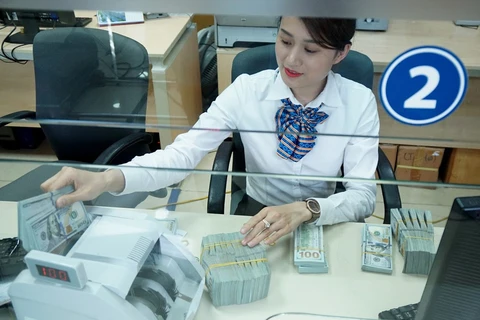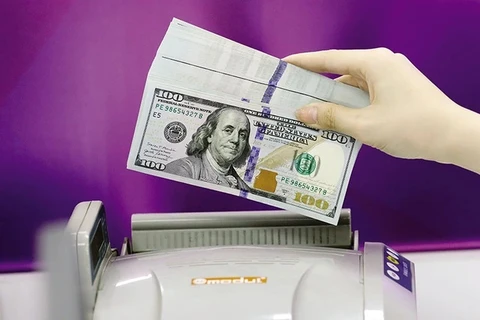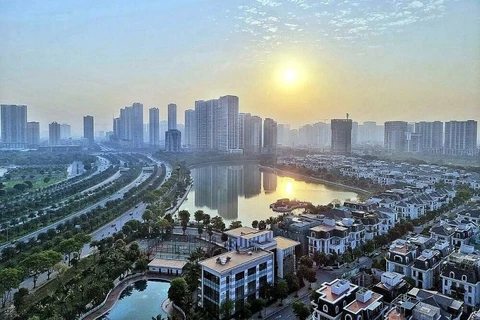Hanoi (VNA) – Amid a “thirst” for capital of real estate businesses, the strong inflow of remittances is expected to heat up the market again, held insiders.
According to Nguyen Duc Lenh, Vice Director of the State Bank of Vietnam (SBV)’s Ho Chi Minh City branch, in the first quarter of this year, the city received 2.86 billion USD of remittances, up 3.5% over the fourth quarter of 2024 and 35.4% over the same period last year, the highest rise in the recent three years.
Remittances were mostly from Asia with a contribution of 59.1%, representing a surge of 81.1 % year on year, he said.
The official noted that last year, the city also saw a year-on-year rise of 43.3% in remittances to 9.46 billion USD.
Vice Chairman of the municipal People’s Committee Vo Van Hoan said that the growth in remittance inflow has contributed to stabilising the exchange rate and foreign currency market and promoting economic growth of the city.
According to the State Committee for Overseas Vietnamese Affairs, Vietnam received more than 190 billion USD in the past 30 years, nearly equal to the amount of foreign direct investment disbursed in the same period.
Particularly, statistics from the SBV branch in HCM City showed that 22% of the total remittance amount was poured into real estate, while those from the Central Institute for Economic Management showed that about 15-20% of that amount was invested directly in the sector.
The Land Law (revised), scheduled to take effect from July 1, 2024, also includes regulations that expand land use rights for overseas Vietnamese (OV) and Vietnamese citizens residing abroad, is expect to drive remittances to the real estate market.
The law includes the group of the Vietnamese origin residing abroad but without the Vietnamese nationality (also known as overseas Vietnamese) as land users, providing them with full rights to land use and housing like domestic citizens and Vietnamese residing abroad who have the Vietnamese nationality.
Meanwhile, people of the Vietnamese origin residing abroad who are permitted to enter Vietnam are allowed to buy and rent houses associated with residential land use rights, and receive residential land use rights in housing development projects, and inherit the right to use residential land and other types of land in the same plot of land with houses, the revised law said.
Experts held that with favourable legal conditions, remittance inflows into the country will contribute to making the real estate market bustle again./.
According to Nguyen Duc Lenh, Vice Director of the State Bank of Vietnam (SBV)’s Ho Chi Minh City branch, in the first quarter of this year, the city received 2.86 billion USD of remittances, up 3.5% over the fourth quarter of 2024 and 35.4% over the same period last year, the highest rise in the recent three years.
Remittances were mostly from Asia with a contribution of 59.1%, representing a surge of 81.1 % year on year, he said.
The official noted that last year, the city also saw a year-on-year rise of 43.3% in remittances to 9.46 billion USD.
Vice Chairman of the municipal People’s Committee Vo Van Hoan said that the growth in remittance inflow has contributed to stabilising the exchange rate and foreign currency market and promoting economic growth of the city.
According to the State Committee for Overseas Vietnamese Affairs, Vietnam received more than 190 billion USD in the past 30 years, nearly equal to the amount of foreign direct investment disbursed in the same period.
Particularly, statistics from the SBV branch in HCM City showed that 22% of the total remittance amount was poured into real estate, while those from the Central Institute for Economic Management showed that about 15-20% of that amount was invested directly in the sector.
The Land Law (revised), scheduled to take effect from July 1, 2024, also includes regulations that expand land use rights for overseas Vietnamese (OV) and Vietnamese citizens residing abroad, is expect to drive remittances to the real estate market.
The law includes the group of the Vietnamese origin residing abroad but without the Vietnamese nationality (also known as overseas Vietnamese) as land users, providing them with full rights to land use and housing like domestic citizens and Vietnamese residing abroad who have the Vietnamese nationality.
Meanwhile, people of the Vietnamese origin residing abroad who are permitted to enter Vietnam are allowed to buy and rent houses associated with residential land use rights, and receive residential land use rights in housing development projects, and inherit the right to use residential land and other types of land in the same plot of land with houses, the revised law said.
Experts held that with favourable legal conditions, remittance inflows into the country will contribute to making the real estate market bustle again./.
VNA























